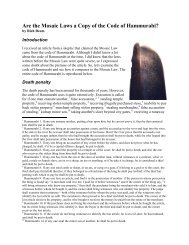Coming to Grips with the Early Church Fathers - Evidence for God ...
Coming to Grips with the Early Church Fathers - Evidence for God ...
Coming to Grips with the Early Church Fathers - Evidence for God ...
Create successful ePaper yourself
Turn your PDF publications into a flip-book with our unique Google optimized e-Paper software.
<strong>Coming</strong> <strong>to</strong> <strong>Grips</strong> <strong>with</strong> <strong>the</strong> <strong>Early</strong> <strong>Church</strong> Fa<strong>the</strong>rs’ Perspective on Genesis John Millam<br />
Emphasis on escha<strong>to</strong>logy. The creation-week framework set up an absolute timeline <strong>for</strong><br />
understanding his<strong>to</strong>ry (past and future). If one was able <strong>to</strong> date backward <strong>to</strong> creation, <strong>the</strong>n<br />
one could work <strong>for</strong>ward <strong>to</strong> determine when certain key events would happen. For <strong>the</strong><br />
church, this meant a way <strong>to</strong> predict Christ’s return, while <strong>for</strong> <strong>the</strong> Jews it pointed <strong>to</strong> <strong>the</strong><br />
coming of <strong>the</strong> Messiah. Lactantius—one of <strong>the</strong> fa<strong>the</strong>rs Mook mentions—went so far as <strong>to</strong><br />
incorporate this idea in<strong>to</strong> his discussion on <strong>the</strong> end times (The Divine Institutes 7.14–25).<br />
His<strong>to</strong>rically, we see that both this model and <strong>the</strong> age estimates were flexed <strong>to</strong> achieve <strong>the</strong><br />
desired goal—a sense of immanence <strong>for</strong> <strong>the</strong> next step in <strong>God</strong>’s plan. 44<br />
Constrained interpretations of Genesis. Mook focuses on <strong>the</strong> fact that even <strong>the</strong><br />
allegorical interpreters (e. g., Origen and Augustine) taught that <strong>the</strong> world was young. For<br />
him, that suggests that <strong>the</strong> age of <strong>the</strong> earth was <strong>the</strong> pivotal issue. What he misses is that<br />
this framework (which is just human tradition) prevented any church fa<strong>the</strong>r from even<br />
considering <strong>the</strong> earth <strong>to</strong> be older than 6,000 years. In o<strong>the</strong>r words, no one could hold that<br />
<strong>the</strong> creation days were long periods of time or that <strong>the</strong>re might be significant gaps in <strong>the</strong><br />
Genesis genealogies because that would not fit <strong>with</strong>in this millenary construct and, thus,<br />
would be perceived as denying Christ’s return. 45 So, <strong>for</strong> those who rejected a calendarday<br />
interpretation of Genesis 1, <strong>the</strong>re was no room <strong>to</strong> even consider a position o<strong>the</strong>r than<br />
instantaneous creation. The patristic fa<strong>the</strong>rs’ failure <strong>to</strong> teach an old earth should not be<br />
construed <strong>to</strong> mean this idea is incompatible <strong>with</strong> Scripture.<br />
Conclusion<br />
Mook devotes many pages <strong>to</strong> documenting <strong>the</strong> creation-week pattern <strong>for</strong> human his<strong>to</strong>ry (or<br />
sex/septa-millenary construct) and its popularity among <strong>the</strong> church fa<strong>the</strong>rs. For him, it is <strong>the</strong><br />
crowning argument <strong>for</strong> his claims of early young-earth creationism. The irony is that while many<br />
indeed saw <strong>the</strong> earth as young, <strong>the</strong> view was driven primarily by human tradition. It is incorrect,<br />
<strong>the</strong>re<strong>for</strong>e, <strong>to</strong> conclude that <strong>the</strong> young-earth view in <strong>the</strong> early church is grounded on a literal<br />
interpretation of Genesis—in fact quite <strong>the</strong> opposite. As such, <strong>the</strong> popularity and consistency of<br />
young-earth creationism in <strong>the</strong> early church is almost entirely artificial and so should not be<br />
construed as supporting modern young-earth creationism. We would be better served by<br />
reassessing Genesis 1–11 <strong>for</strong> ourselves ra<strong>the</strong>r than relying on <strong>the</strong> early church <strong>for</strong> direction on<br />
this issue.<br />
Was <strong>the</strong> age of <strong>the</strong> earth considered vital <strong>to</strong> Christian orthodoxy in <strong>the</strong><br />
early church?<br />
While <strong>the</strong> days of creation, <strong>the</strong> age of <strong>the</strong> earth, and <strong>the</strong> extent of Noah’s flood were subjects of<br />
popular speculation in <strong>the</strong> early church, <strong>the</strong>y were never treated as critical issues. First of all, not<br />
44. The creation-week framework changed and evolved over time, as has already been described. (1) Jewish rabbis,<br />
following <strong>the</strong> Hebrew values in Genesis 5 and 11, placed <strong>the</strong> Messiah’s coming in <strong>the</strong> four thousandth year. (2)<br />
<strong>Early</strong> church fa<strong>the</strong>rs (first three centuries), following <strong>the</strong> Septuagint values, held that Jesus would return on <strong>the</strong><br />
six thousandth year. (3) <strong>Church</strong> fa<strong>the</strong>rs of <strong>the</strong> fourth and fifth centuries suggested a younger age <strong>for</strong> <strong>the</strong> earth <strong>to</strong><br />
postpone expectations of Jesus’ return. (4) Later <strong>the</strong>ologians, following <strong>the</strong> Vulgate (and hence <strong>the</strong> Hebrew<br />
values), res<strong>to</strong>red <strong>the</strong> idea of <strong>the</strong> Messiah coming on <strong>the</strong> four thousandth year and placed his return on <strong>the</strong> six<br />
thousandth.<br />
45. John Millam, “The Genesis Genealogies,” Reasons To Believe, accessed September 28, 2010,<br />
http://www.reasons.org/files/non-staff-papers/The-Genesis-Genealogies.pdf.<br />
Page 14 <strong>Evidence</strong> <strong>for</strong> <strong>God</strong> from Science






